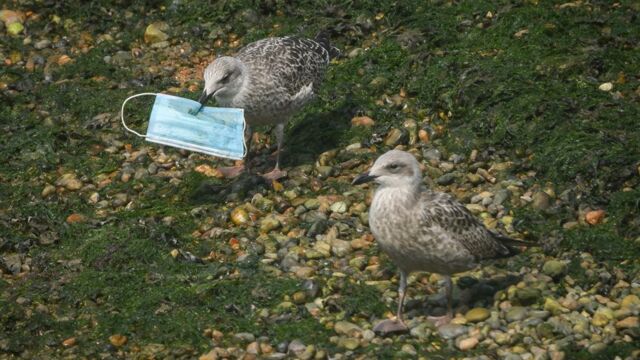Disturbing images show how face masks are hurting wildlife

Disturbing images of a seagull tangled up in the straps of a face mask show how single-use masks are hurting wildlife.
It’s no secret that disposable masks are bad for the environment–they pollute the oceans and animals feed on them mistaking it for food. Images of a seagull getting caught up in the ear loops of a disposable mask have surfaced, giving us yet another reason to trade in our disposable masks for cloth ones.
Discover our latest podcast
Surgical masks hazardous to wildlife
A distressed seagull was seen stumbling and falling in the streets of Chelmsford, Essex when an RSCPA staff member caught the young gull and brought it to the South Essex Wildlife hospital. Hospital staff members carefully cut off the straps tangled up in the gull’s feet. After days of agonizing pain, the seagull was finally free. His joints were swollen and sore from the tight grip of the elastic straps. The seagull is recovering and is being monitored carefully before being released back into the wild.
More under this adMore under this ad
Since wearing face masks has become mandatory in many countries around the world, factories have reported making 20 times more surgical and N95 masks a day. An estimated 129 billion face masks are being disposed of into the environment. Personal Protective Equipment (PPE) can hurt wildlife by entangling them, and they can even kill when animals accidentally ingest them.
More under this adMore under this adHow to dispose of single-use face masks?
If you wear disposable face masks, make sure to dispose of them properly.The RSCPA of England and Wales is ‘urging people to snip the straps from disposable face masks.’ In a Facebook post, they claim there have dealt with over 900 incidents of wild animals being caught in litter since the beginning of lockdown ‘including animals tangled in face masks.’

Wearing cloth masks can end up saving the life of many wild animals. They can be worn for up to a month, as opposed to disposable masks, and are thus less likely to end up as litter.